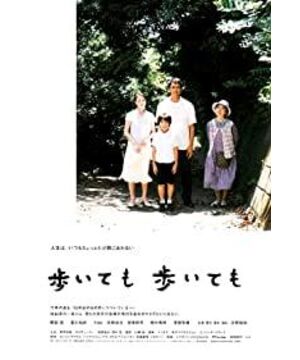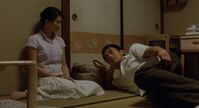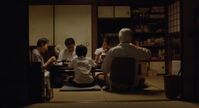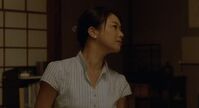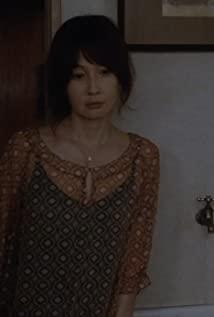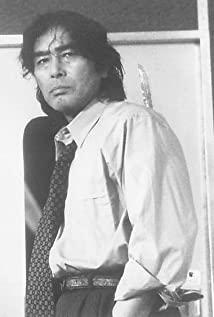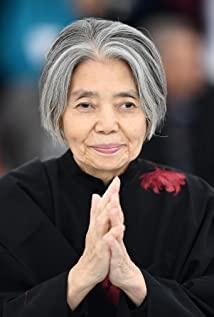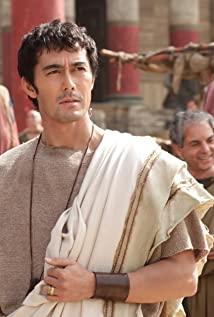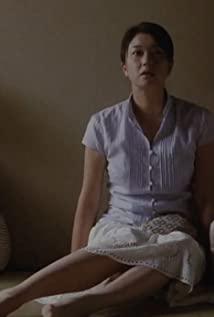Some people say that some directors only make one type of movie in their life. It's Hirokazu Ke that is such a director.
Whether it is "Father Like Son" or "Haijie Diary", or "Non-Stop Walking" that I want to introduce to you today, there are always two constant elements in the story of Hirokazu Zhi: family and parent-child.
A great work is a great work because it does not just show the good side of life. It is Hirokazu Kee who is gentle and cruel. His stories always carry irresistible separation and suffering in the world, but at the end, he will tell you with a plain lens that happiness itself is to walk through the quagmire of life.
It is Hirokazu Ke that is always good at using trivial daily interactions and plain shots to create a subtle atmosphere in the space . When watching the movie, you will feel that this conversation has happened between yourself and your mother, or the busy figure of the old woman in the kitchen is so similar to your own grandmother. You can always see yourself in the story of Hirokazu Ee.
However, precisely because of this style of using this atmosphere to make the audience resonate with the storyline, it is difficult for the director to express what the director intends to convey in the form of pictures and words. I suggest, and I hope you, after reading the article, really go to watch the movie "Non-Stop Walking", and really walk into the story of Hirokazu Ee.
The story happened in the Hengshan family in a small town. At the beginning of the movie, the old woman and the eldest daughter are preparing food for the family dinner. When the daughter was going to ask her father to go out to buy milk, the old woman stopped her and said that he would not buy it. Grandpa didn't want the neighbors to see him holding a shopping bag.
Grandpa is a retired doctor, but because of his professionalism and sense of responsibility, he is always concerned about the affairs of the small town clinic. He paranoidly hopes that everyone will still call him a "doctor."
At the same time, the son Ryota played by Hiroshi Abe rushed home with his wife and little boy. Ryota was not enthusiastic about this family gathering, and had already planned the time for the return trip.
When the old woman complained about her daughter, we learned that Ryota's wife was a widowed widow, and the child was born to her and her ex-husband. The little boy was quiet and introverted, and called Liang Tai by his name, calling him A Liang.
On the way home, Ryota told his wife that he was the second son. There is an older brother on him.
In the following plot, the story gradually reveals the reason why the eldest son of the Hengshan family has never appeared.
Liang Tai's family arrives. The mother-in-law's reception was warm but alienated. The eldest daughter’s child asked Liangta’s stepson how did you feel when your biological father died? The little boy replied, don't remember, I am too young.
When the old woman was frying corn tempura, she recalled that the eldest son Junpei cleverly said when he was very young, we don’t need to buy corn ourselves, the neighbor would send corn. Everyone recalled their eldest son Junpei, and laughed again and again, but there was a faint sorrow under the laughter.
During the meal, the grandfather sang against everyone who was chatting, saying that the widow would not be able to remarry with the child. Grandpa's dislike and unacceptance of the second son Liangtai's family made the atmosphere very embarrassing.
In addition, Grandpa also disagrees with Liangta's career as a painting restorer. Liang, who had been suppressed by his father, replied rudely: "I earn enough money to sustain a widow's life."
In order to avoid the awkward atmosphere downstairs, the women went upstairs to look at old photos. My sister turned to the composition written by Liang Taixiao. Ryota, who showed no interest in inheriting his father's hospital, actually wrote "I want to be a doctor" in an essay when she was young.
Ryota ran into her sister reading her composition, and angrily took the composition away and tore it off.
The photo of the eldest son's death was placed on the table, and everyone ran around in front of them, preparing to take a photo of the family. Grandpa angrily refused to take pictures with them. The old woman took up the portrait of the eldest son and stood in the middle.
In the narration of the old woman's recollection, the mystery is finally revealed. It turns out that the eldest son in the family who has always been highly regarded by her mother-in-law and grandfather was drowned because he saved others 15 years ago.
The old woman said that the night when Junping left, she was wiping his shoes and suddenly wanted to go to the beach. If she said something at the time, maybe he would not go to the beach, would not die for saving people, everything would be different.
The old woman said, I will never forget the look of those clean shoes.
The old woman sighed: Why did he save that person? That person has nothing to do with him...
When it comes to the eldest son Junpei who no longer exists, everyone's words are cautious and cautious. It was Hirokazu that this kind of "not taste" atmosphere was excellent. The Sri Lankan has passed away, but the deceased seems to have become a fishbone that penetrates everyone's souls.
Grandpa secretly called the little boy to the room and gave him pocket money. Although grandpa does not accept the marriage of his second son Liangta and Liangta on the surface, his heart is full of love for the children.
The little boy was iced when he was eating ice cream. The grandfather, who had always been stern-faced, said gently at this moment, "It's okay, you can throw it up." The little boy did not throw up, but frowned and swallowed stubbornly.
Grandpa asked, what do you want to do in the future, the little boy said, piano tuner. Grandpa asked, why, the little boy said, because I like my music teacher.
Grandpa said that my father was sick when I was a child, so I wanted to become a doctor, but when I became a doctor, my father was no longer alive.
Hearing their conversation, Liang said angrily that he would not become a doctor. Grandpa said, I can't wait for 20 years anyway. But in his heart, grandpa still hopes that someone can inherit his career as a doctor and continue his dream.
The mother-in-law took them to visit the grave of the eldest son. While sweeping the tomb, the mother-in-law scooped a scoop of water on the tombstone and murmured, "It's very hot, so it will be cooler."
On the way home after sweeping the tomb, the mother-in-law and Ryota talked about the legend of the yellow butterfly, “Some people say that the butterfly survives the winter and will turn yellow the next year.”
This legend made her mother-in-law think that the yellow butterfly represents the soul of the dead, which reminded her of her deceased eldest son, so every time she saw the yellow butterfly, she would be very sad.
The child who was saved by the eldest son has grown up and has become a fat man who has not achieved much. He appeared cramped and restrained in front of the benefactor's family, sweating profusely because of the hot weather.
Grandpa sat alone with his back to the crowd, and said, "Why should my son save such a useless person?"
Mrs. Liang stayed for dinner. At dinner, the grandfather talked about the importance of career to men. The old woman said, but you were not even present when your son died. Behind the aroma of the food, there is a faint pain that cannot disappear after the old man loses his child.
While chatting in the evening, the old woman and Ryota talked about a sumo wrestler, but couldn't remember his name anyway.
Ryota said to her mother, let's not call the rescued person. He seemed to be in pain when he saw us.
The smile disappeared from the mother-in-law's face. She said that by inviting him every year, he would not forget Junpei's death many years later. Because if there is no object to hate, I feel more painful , so I call him home once a year. If he is not in pain, it is us who are in pain.
Before taking a bath, Ryota suddenly said to his father that everyone had always laughed at it. The clever remark about corn was not made by my brother , but by me.
He just competed with his dead brother for a joke from the old days. Liang knew too that in the hearts of his parents, he would never be able to replace the eldest son in their hearts. He cared so much when he argued, but it was so futile.
Suddenly, a yellow butterfly flew in. The old woman firmly believed that the yellow butterfly was the incarnation of the deceased eldest son, chasing the yellow butterfly almost madly, chanting her son's name in her mouth.
The old man desperately chased the back of the butterfly, which was sour. At this moment, after all, she was just an ordinary mother who missed her son. In her heart, she would never accept that her beloved son abandoned her like this.
Suddenly, the neighbor called and said that he was unwell. Grandpa was very anxious, but he could only say helplessly, I am no longer a doctor , so I should call an ambulance.
When the first responders arrived, Grandpa wanted to step forward to help, but was stopped by the paramedics who thought he was an "irrelevant person." The once famous doctor in the small town is a funny and embarrassed old man at this moment. All this makes people feel extremely sad.
Before going to bed, my mother said to the little boy that although your father died, he did not really leave. He is in your body and he is a part of you.
The little boy asked, what about A Liang. Mom said, A Liang will also become a part of you, slowly and firmly, becoming a part of you.
In the middle of the night, the little boy walked into the yard by himself and said firmly in the dark, I want to be a piano tuner like my dad. If this is not possible, I want to be a doctor.
The little boy said calmly in front of others that he did not remember his father's death, and told his grandpa that the reason he wanted to be a tuner was because he liked music teachers. But in fact, he remembered his father clearly, and he said firmly in the night alone that he wanted to be a tuner because he wanted to be the same person as his father.
At the same time, Ryota put together the composition that had been torn off by herself in the room.
On the surface, Ryota, who firmly didn't want to inherit his father's career as a doctor, posted a composition vowing to "become a doctor" in the middle of the night.
What was it that made us all fail to become ideal adults in the end?
Early the next morning, Liang Tai's family set off for home. When I got on the bus just now, Ryota said in relief that the New Year could not come again.
At the same time, the old woman and grandpa were walking on the way home. Grandpa said with anticipation that next time they come, it should be the New Year.
On the bus, Ryota suddenly remembered the sumo wrestler who had been thinking about it with his mother at night, but had never thought of it. He turned his head in annoyance, but the car had started and drove far.
He sighed, why do I always take a slow shot.
The old woman and grandfather walked up the steps step by step, and Liangtai's off-screen voice sounded:
All this seemed to be a huge metaphor, just as Ryoto remembered the name of a sumo wrestler with chagrin after getting on the bus.
"I always take a beat."
The tree wants to be quiet but the wind keeps on, and the child wants to support but the kiss does not wait.
At the end of the film, Ryota, who had already given birth to his own child with his wife, took the family to visit his brother's grave many years later. He took a scoop of water and poured it on his brother's tombstone, just like his mother did.
On the way back, he told his daughter the story of the surviving yellow butterfly that his mother told him.
The daughter asked, who told you this?
Ryota couldn't remember it. He said, yes, who told me that, I can't remember.
Hirokazu Edema's lens was flat and delicate. His story is full of forced separation, the separation of life and death, children who have not grown up as ideal adults, and adults full of regrets.
In the story, the estrangement between parents and children seems to be slowly dissolving, but it is always a bit slower.
Ryota didn't understand the importance of the doctor's profession to his father until he saw his father's expression of loneliness when he was pushed away by emergency personnel.
Before his father's death, Ryota kept saying stubbornly, "I won't be a doctor, and I won't let my son be a doctor." In the end, he didn't have time to watch a game with his father, and he didn't have time to tell his mother that sumo wrestling. The name of the athlete.
It is the classic composition of Hirokazu Edema-on the road, two pairs of mother and child, one in front and one behind.
At the end of the film, Ryota talked to her daughter about what her mother and herself said, that the butterflies that survive the winter will turn yellow. At this time, Ryota, like his mother back then, pinned his thoughts on the deceased on the legend of Yellow Butterfly. It's a pity that he didn't understand his mother's obsession and grief. The night the yellow butterfly flew in, he opened the doors and windows and let the butterfly fly away.
Like the legend of the Yellow Butterfly, which carries hope and self-comfort, the warmth between parent and child generations will be passed on with unavoidable pain, but it may be a bit slower.
Always wait until the child has grown into an adult full of regrets and scars, before the parents realize that they did not give their children proper love;
Similarly, we always have to wait until the parents or the elderly have left us forever before we remember that we can give them a little more understanding or accompany them more in so many times.
But, whether it is a lover, a loved one, or someone who appears in our lives by chance, they will all become part of us just as the movie says.
Slowly, firmly, become part of us.
So, hurry up and love the people around you,
Don't wait for them to leave us to say we love him.
Because on the road of life, we keep walking.
"We are jumping off the cliff with our eyes closed every day, but this is a soft land."
I like it? It’s better to pay attention to us by the way. We have psychological knowledge with temperature and attitude, and I will give you all~ (๑•ᴗ•๑)
View more about Still Walking reviews


